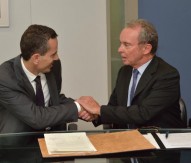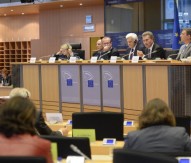
The importance of partnership
Professor Andrew Boulton, president of the European Association for the Study of Diabetes (EASD) and the European Foundation for the Study of Diabetes (EFSD), outlines the role of the two organisations, their European partnerships and the need for further collaboration in order to combat increasing competition from the USA in diabetes research.
In 1999, the European Association for the Study of Diabetes (EASD) increased its commitment to stimulate diabetes research in Europe by creating the European Foundation for the Study of Diabetes (EFSD). The foundation is closely related to the EASD as it is governed exclusively by its executive committee which comprises the same officers as the executive committee of the EASD. The EASD itself is under the close supervision of the EASD council and the general assembly of the EASD.
The foundation operates on a strictly not-for-profit basis under the control of the relevant authorities for charity and taxation in order to support diabetes research. EASD, as an academic non-profit association, benefits from the possibilities offered by the legal status of its foundation to advance diabetes research by various methods.
Partnerships
In order to foster diabetes research at the highest level in Europe, the EFSD has entered into innovative partnerships with both other foundations and industry. To date, the EFSD has committed over €88m to diabetes research in Europe by various funding means. Together with its partners, AstraZeneca/Bristol-Myers Squibb (BMS), Boehringer Ingelheim, the Chinese Diabetes Society (CDS), the Juvenile Diabetes Research Foundation (JDRF), Janssen, the Japan Diabetes Society (JDS), Lilly, Merck Sharp & Dohme (MSD), Novo Nordisk A/S and Sanofi, EFSD runs numerous basic and clinical research programmes focusing on topics ranging from the role of the kidney in diabetes to patient education.
The applications and grant distribution process is subject to rigorous peer review by a fully independent panel of leading experts in the field and awards are based purely on scientific merit – EASD and EFSD pride themselves on their independence and transparency. Applications are welcome from Europe or any associated country and there are also specific programmes aimed at building a bridge between European and non-European countries in the context of collaborative research programmes; examples include the EFSD/Japanese Diabetes Society reciprocal travel fellowships and the EFSD/Chinese Diabetes Society/Lilly research fellowships.
Expenditure deficiency
However, despite this impressive amount of funding which has passed through bodies such as the EFSD, there is a major deficiency in terms of expenditure in Europe when it comes to medical research. Europe is falling behind its traditional competitors in biomedical and health-related research, particularly the USA, as well as now having to face increasing competition from newly emerging countries such as China and India.
Figures have shown that the investment in research in Europe is woefully low in comparison to that of the United States. In the case of diabetes, 2008 saw $1.08bn (~€798m) being spent in the USA compared to just €323m in Europe.
Alliance
However, steps are now being made to improve the current imbalance. In recent years, the European biomedical community has come together through an initiative called the ‘Alliance for Biomedical Research in Europe’. The alliance, which represents approximately 250,000 scientists from numerous research institutes, associations and organisations, is calling on national and EU level policy makers to take action in order to benefit all citizens of Europe. The overall aim of the alliance is the realisation of long-term strategic research programmes capable of triggering multidisciplinary partnerships and addressing the full innovation cycle. One would hope that this umbrella organisation could co-ordinate biomedical and health-related research in Europe and bring the necessity of research and the explicit need for more funding to the forefront of European politics.
Professor Andrew Boulton




